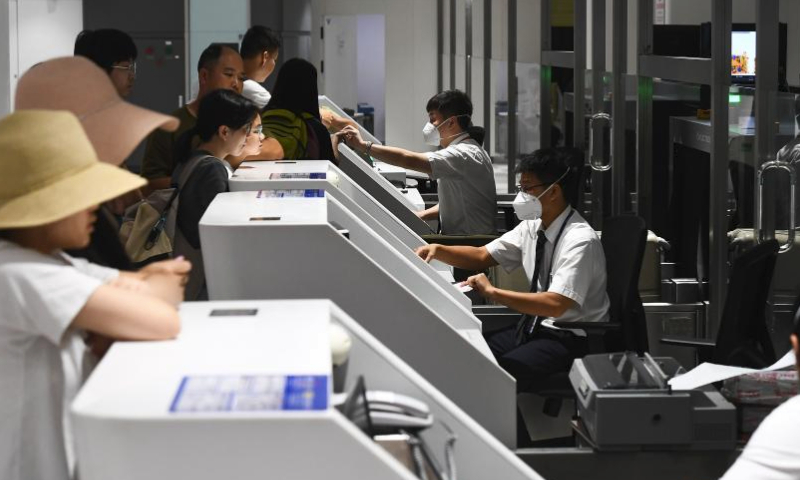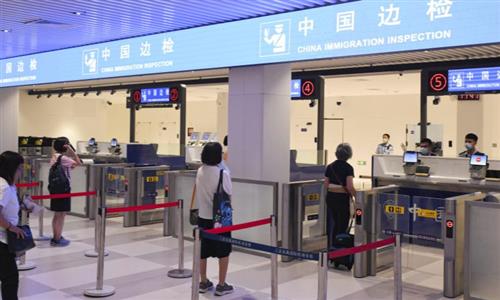China set to cancel 'black code' requirement at border ports, removing barriers to customs clearance

Passengers check in at the international terminal of Sanya Phoenix International Airport in Sanya, south China's Hainan Province, July 26, 2023. The main works of the renovation and expansion project for the international terminal of Sanya Phoenix International Airport has been completed and put into use on July 1, as Hainan Province is preparing for island-wide independent customs operations by the end of 2025. (Xinhua/Yang Guanyu)
Starry Lee Wai-king, a Hong Kong Special Administrative Region's (HKSAR) deputy to the Standing Committee of the National People's Congress, quoted the General Administration of Customs of China as saying that the cancellation of the "black code," the health declaration procedure for entry and exit in the Chinese mainland from Hong Kong, is in the final approval stage and she is confident that it will be canceled starting from Wednesday, reported Hong Kong media outlets.
Experts say that the full cancellation of the "black code" to achieve zero barrier customs clearance is good news for the general public, convenient for the people of the two regions, and contributes to their demand for economic development.
Lee also mentioned that some elderly people have said that they do not know how to apply for the health declaration code using their mobile phones and hope it will be canceled as soon as possible. She noted that this will facilitate the movement of people between the two regions.
Due to the COVID-19 pandemic, the Chinese mainland started a quarantine declaration system in January 2020. People entering or exiting ports must fill out a health declaration card and declare their health to the customs health quarantine department to obtain a QR code, known as the "black code," for clearance.
The border between the HKSAR and the Chinese mainland reopened fully on February 6. Although requirements such as nucleic acid testing and restrictions on the number of people have been lifted, travelers still need to use their mobile phones to fill out the health declaration form and scan the health declaration code when entering or exiting the Chinese mainland.
According to reporters who entered the Chinese mainland from HKSAR via high-speed rail on Saturday, after getting off the train they could still see notices asking passengers to fill out the health declaration form, but the computer equipment providing scanning codes had been turned off and the staff did not ask for a black code. For visitors entering Shenzhen via Luohu Port, passengers still needed to pass through the gate with a health code. At the departure hall returning to the HKSAR, passengers still had to scan the health codes, and two to three officers were on site to monitor the scanning.
After the full reopening of the two regions, traveling north to the mainland for consumption has become a daily routine for Hong Kong residents. On average, 160,000 to 180,000 people per day have been traveling to the Chinese mainland for leisure activities since the reopening.
Experts said that new attractions, experiences, commercial districts, business models and brands in Chinese mainland are rapidly emerging, bringing a continuous sense of freshness and attraction to fashion-loving Hong Kong residents. The complete cancellation of the health code system to achieve zero barrier entry and exit is great news for the general public, facilitating the exchange between the two cities, Jacky Ko Chung-kit, a 44-year-old Hong Kong online opinion leader, told the Global Times on Monday.
Edward Lau Kwok-fan, a member of the Legislative Council of the HKSAR, said that during the recent Double Ninth Festival holiday, a large number of Hong Kong residents traveled to the Chinese mainland, causing congestion at checkpoints. He noted that the current pandemic situation is under control and canceling the health code is an appropriate decision.
In response, experts suggest that effective diversion of border traffic requires the adoption of diverse administrative measures, such as a one-stop inspection to save on entry time, as well as the establishment of more 24-hour ports.
Cing Yu-tse, an engineer who lives in the HKSAR and has family members who live in Shenzhen, told the Global Times that since the resumption of cross-border travel, she often goes to Shenzhen or Zhuhai to buy clothes and things for her children. However, during holidays, there are always more people crossing the border, and the time spent is a bit long.
"If the health code can be canceled next month, I may visit my parents more frequently, allowing us to have more opportunities to reunite," Cing said.
Meanwhile, Chen Shinan, a high school teacher whose child is studying in the HKSAR, said that previously, due to the lengthy procedures for crossing the border, he had rented a house in the HKSAR so his child could more conveniently go to school.
"Upon hearing the news of the complete cancellation of the health code, we are considering having our child return to Shenzhen to live with us. This way, we can save on expenses and have a family reunion, reducing the cost of education," Chen noted. "We can feel that the impact of the pandemic on our lives is gradually becoming history."

